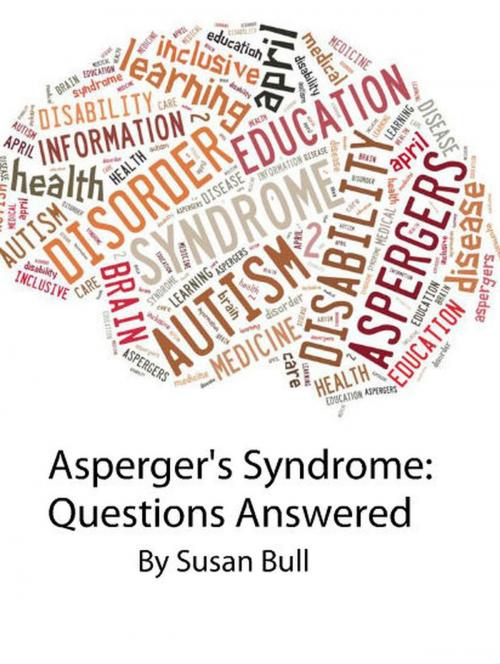Asperger's Syndrome: Questions Answered
Nonfiction, Health & Well Being, Psychology, Cognitive Psychology, Mental Health, Family & Relationships| Author: | Susan Bull | ISBN: | 9781540117038 |
| Publisher: | Sepharial | Publication: | June 24, 2017 |
| Imprint: | Language: | English |
| Author: | Susan Bull |
| ISBN: | 9781540117038 |
| Publisher: | Sepharial |
| Publication: | June 24, 2017 |
| Imprint: | |
| Language: | English |
The term "autism spectrum" refers to a wide range of developmental disabilities. These disabilities can appear in different combinations with varying degrees of severity: two children with the same diagnosis, though they may share certain patterns of behavior, can have a wide range of skills and abilities. As a result, general terms such as "low-functioning," "high-functioning," "autistic tendencies," "pervasive developmental disorder," and others are often used to describe children whose behaviors fall on the autism spectrum.
Kids with AS are generally considered to be on the "high-functioning" end of the autism spectrum. Boys are three to four times more likely than girls to have AS. The incidence seems to be increasing, but this might be because milder cases are being identified more frequently.
Although Asperger syndrome is no longer considered to be a diagnosis all on its own, many parents and people in the medical community still use the term.
About Asperger Syndrome
The disorder is named after Hans Asperger, a Viennese pediatrician who, in 1944, first described a set of behavior patterns apparent in some of his patients, mostly males. Asperger noticed that although these boys had normal intelligence and language development, they had severely impaired social skills, couldn't communicate well with others, and had poor coordination.
According to the Asperger Syndrome Coalition of the United States, the onset of AS may be later than what is typical in autism — or at least is recognized later. Many kids are diagnosed after age 3, with most diagnosed between the ages of 5 and 9.
The term "autism spectrum" refers to a wide range of developmental disabilities. These disabilities can appear in different combinations with varying degrees of severity: two children with the same diagnosis, though they may share certain patterns of behavior, can have a wide range of skills and abilities. As a result, general terms such as "low-functioning," "high-functioning," "autistic tendencies," "pervasive developmental disorder," and others are often used to describe children whose behaviors fall on the autism spectrum.
Kids with AS are generally considered to be on the "high-functioning" end of the autism spectrum. Boys are three to four times more likely than girls to have AS. The incidence seems to be increasing, but this might be because milder cases are being identified more frequently.
Although Asperger syndrome is no longer considered to be a diagnosis all on its own, many parents and people in the medical community still use the term.
About Asperger Syndrome
The disorder is named after Hans Asperger, a Viennese pediatrician who, in 1944, first described a set of behavior patterns apparent in some of his patients, mostly males. Asperger noticed that although these boys had normal intelligence and language development, they had severely impaired social skills, couldn't communicate well with others, and had poor coordination.
According to the Asperger Syndrome Coalition of the United States, the onset of AS may be later than what is typical in autism — or at least is recognized later. Many kids are diagnosed after age 3, with most diagnosed between the ages of 5 and 9.















